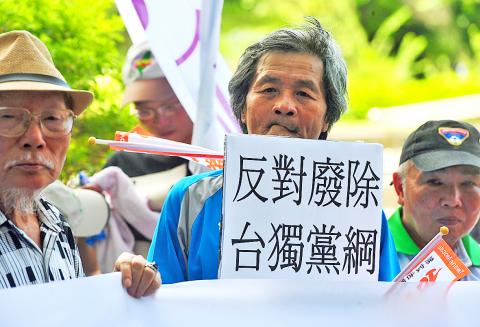Debate among Democratic Progressive Party (DPP) members over whether the party should freeze the Taiwan independence clause in its charter arose again yesterday ahead of a party congress to be held on Sunday.
A group of pro-independence advocates expressed strong opposition to a proposal to freeze the clause by protesting in front of the DPP’s headquarters in Taipei yesterday and called for the proposal’s initiators, former DPP legislators Julian Kuo (郭正亮) and Chen Zau-nan (陳昭南), to resign from the party.
Chen submitted a petition, drafted by Kuo, on June 19 that calls for the party to freeze the clause during the congress, saying that it would help the DPP regain power in the 2016 presidential election.

Photo: Chien Jung-fong, Taipei Times
The proposal has drawn mixed reviews from DPP members, with some submitting a suggestion that the party implement its independence clause.
DPP Chairperson Tsai Ing-wen (蔡英文) addressed the issue during a recent meeting with foreign journalists, saying that reworking the party charter was not a priority and consensus-building on the topic could be a long process.
DPP headquarters did not respond to yesterday’s protest.
However, Chen responded by reiterating that the nation has long been a sovereign and independent country since its president and its legislature are democratically elected, adding that a declaration of independence was not an issue.
“If [the protesters] called for the establishment of the Republic of Taiwan [ROT], then they should try to amend the Constitution. And they should ask Tsai Ing-wen why she said during her [2012] presidential campaign that ‘Taiwan is the Republic of China (ROC) and the ROC is Taiwan,’” Chen said.
The past three DPP presidential candidates — former president Chen Shui-bian (陳水扁), former premier Frank Hsieh (謝長廷) and Tsai — did not include the establishment of a ROT, which is clearly stated in the independence clause, as part of their campaign platforms, Kuo said.
“That tells us that the clause about establishing a ROT was only nominal,” Kuo said.
Meanwhile, another proposal is likely to come up at the congress.
DPP Legislator Chen Ting-fei (陳亭妃) yesterday said that she planned to propose that the party implement another of its controversial resolutions — the 2007 resolution on making Taiwan a “normal country.”
In response to questions from reporters, Hsieh yesterday said the independence issue was bound to be complex because it depends how one interprets or defines “Taiwanese independence.”
While some viewed Taiwan as a sovereign and independent country, others argue that de facto independence is lacking, “so it really depends on how you define independence,” Hsieh said, adding that all controversial proposals would require advanced discussions.
DPP officials who are familiar with the party congress process said that it could be technically difficult for the party to reach a consensus on the proposals because of time restraints.
The congress’ primary agenda is the elections of the party’s Central Executive Committee and Central Standing Committee, so there would be little time left to discuss the proposals, the officials said.

Alain Robert, known as the "French Spider-Man," praised Alex Honnold as exceptionally well-prepared after the US climber completed a free solo ascent of Taipei 101 yesterday. Robert said Honnold's ascent of the 508m-tall skyscraper in just more than one-and-a-half hours without using safety ropes or equipment was a remarkable achievement. "This is my life," he said in an interview conducted in French, adding that he liked the feeling of being "on the edge of danger." The 63-year-old Frenchman climbed Taipei 101 using ropes in December 2004, taking about four hours to reach the top. On a one-to-10 scale of difficulty, Robert said Taipei 101

Taiwanese and US defense groups are collaborating to introduce deployable, semi-autonomous manufacturing systems for drones and components in a boost to the nation’s supply chain resilience. Taiwan’s G-Tech Optroelectronics Corp subsidiary GTOC and the US’ Aerkomm Inc on Friday announced an agreement with fellow US-based Firestorm Lab to adopt the latter’s xCell, a technology featuring 3D printers fitted in 6.1m container units. The systems enable aerial platforms and parts to be produced in high volumes from dispersed nodes capable of rapid redeployment, to minimize the risk of enemy strikes and to meet field requirements, they said. Firestorm chief technology officer Ian Muceus said

MORE FALL: An investigation into one of Xi’s key cronies, part of a broader ‘anti-corruption’ drive, indicates that he might have a deep distrust in the military, an expert said China’s latest military purge underscores systemic risks in its shift from collective leadership to sole rule under Chinese President Xi Jinping (習近平), and could disrupt its chain of command and military capabilities, a national security official said yesterday. If decisionmaking within the Chinese Communist Party has become “irrational” under one-man rule, the Taiwan Strait and the regional situation must be approached with extreme caution, given unforeseen risks, they added. The anonymous official made the remarks as China’s Central Military Commission Vice Chairman Zhang Youxia (張又俠) and Joint Staff Department Chief of Staff Liu Zhenli (劉振立) were reportedly being investigated for suspected “serious

Nipah virus infection is to be officially listed as a category 5 notifiable infectious disease in Taiwan in March, while clinical treatment guidelines are being formulated, the Centers for Disease Control (CDC) said yesterday. With Nipah infections being reported in other countries and considering its relatively high fatality rate, the centers on Jan. 16 announced that it would be listed as a notifiable infectious disease to bolster the nation’s systematic early warning system and increase public awareness, the CDC said. Bangladesh reported four fatal cases last year in separate districts, with three linked to raw date palm sap consumption, CDC Epidemic Intelligence